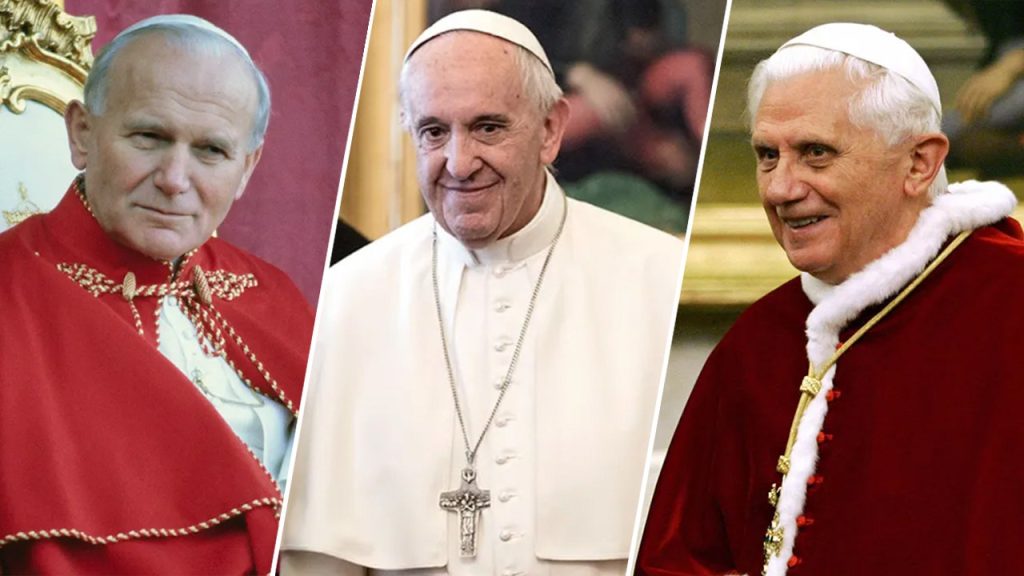Concerns for Pope Francis have escalated following his recent diagnosis of bilateral pneumonia, prompting prayers from Catholics worldwide. The Vatican has confirmed that the 88-year-old pontiff will remain hospitalized for treatment. This situation arrives amidst a historical examination of recent popes, particularly their significant roles during tumultuous times in history and the various challenges they faced while leading the Catholic Church.
| Article Subheadings |
|---|
| 1) Health Concerns for Pope Francis |
| 2) The Legacy of Pope Benedict XVI |
| 3) The Impact of Pope John Paul II |
| 4) Brief Reigns: Pope John Paul I and Pope Paul VI |
| 5) Enduring Criticism: Pope Pius XII |
Health Concerns for Pope Francis
The Vatican has confirmed that Pope Francis is suffering from bilateral pneumonia and will remain under medical care. Announced by the Vatican’s spokesperson, the news has prompted widespread concerns among the faithful as well as global leaders. The pontiff has been undergoing treatment, with updates provided regularly by the Vatican. As he celebrated Mass prior to his hospitalization, it was noted that despite his age and health challenges, the pope has consistently carried out his duties with dedication. Observers have acknowledged the significance of his health in relation to the ongoing leadership of the Catholic Church at a time of evolving challenges.
The Legacy of Pope Benedict XVI
Pope Benedict XVI, born Joseph Ratzinger, served as the leader of the Catholic Church from 2005 until his resignation in 2013, marking a historic moment as he became the first pope to step down in nearly 600 years. Benedict’s tenure was characterized by theological conservatism and an earnest quest for interfaith dialogue. As an intellectual and theologian, he faced significant scrutiny over his handling of various scandals, including accusations regarding the church’s response to abuse claims. His resignation was attributed to health concerns, allowing him to dedicate his later years to contemplation and prayer. This decision has sparked discussions about the expectations of papal leadership, especially in light of health-related issues.
The Impact of Pope John Paul II
Elected in 1978, Pope John Paul II stands out not only for his unprecedented travels but also for the profound impact he had on global politics and the Catholic faith. His papacy, which lasted for 26 years, witnessed significant events in history, including the fall of communism in Eastern Europe. John Paul II was the first pope from Poland and adeptly utilized his position to promote peace and compassion, famously saying, “Be not afraid” during tumultuous times. His encounter with the would-be assassin in 1981 showcased his commitment to forgiveness, further solidifying his leadership legacy. Canonized as a saint in 2014, his teachings continue to influence the Church’s direction.
Brief Reigns: Pope John Paul I and Pope Paul VI
Pope John Paul I, known as Albino Luciani, had an extraordinarily brief papacy, spanning just 33 days in 1978 before his untimely death. During this short tenure, he was celebrated for his humble demeanor and affectionately referred to as “the Smiling Pope.” On the other hand, Pope Paul VI, born Giovanni Battista Montini, was a pivotal figure in the Vatican II reforms and advocated for a more modern Church. His efforts to build interfaith relations and conclude Vatican II established him as a respected leader during a period of necessary change. His canonization in 2018 reinforces his lasting impact on the Catholic Church.
Enduring Criticism: Pope Pius XII
Pope Pius XII, who led the Church during World War II, has been a controversial figure, especially concerning the Holocaust. Critics argue that his silence in response to the atrocities occurring led to a significant moral failure on the part of the Vatican. Despite this criticism, the Vatican has defended his actions, claiming he worked behind the scenes to aid the Jewish community. Born Eugenio Pacelli, Pius XII’s papacy challenges historians and theologians alike, as they grapple with the balance between political neutrality and moral responsibility during one of history’s darkest epochs. Discussions surrounding his legacy often emphasize the importance of transparency and the ethical obligations of religious leaders.
| No. | Key Points |
|---|---|
| 1 | The Vatican has announced that Pope Francis is hospitalized due to bilateral pneumonia. |
| 2 | Pope Benedict XVI resigned in 2013, a historic decision influenced by health issues. |
| 3 | Pope John Paul II’s papacy was marked by extensive travel and a commitment to forgiveness. |
| 4 | Pope John Paul I had a brief but admired papacy, known for his warmth and humility. |
| 5 | Pope Pius XII’s actions during WWII remain controversial, raising questions about moral leadership. |
Summary
The health of Pope Francis raises significant concerns at a pivotal moment for the Catholic Church, prompting reflection on previous popes’ legacies. From the compassionate teachings of Pope John Paul II to the controversial tenure of Pope Pius XII, the history of these leaders offers insights into the Church’s navigation through modern challenges. Their legacies continue shaping the ongoing conversation about faith, morality, and leadership in an ever-evolving world.
Frequently Asked Questions
Question: What is the current health status of Pope Francis?
Pope Francis is currently hospitalized for treatment of bilateral pneumonia, with ongoing updates being provided by the Vatican regarding his condition.
Question: Who was the first pope to resign in nearly 600 years?
Pope Benedict XVI, originally Joseph Ratzinger, made history by resigning in 2013 due to health concerns.
Question: What were the key contributions of Pope John Paul II during his papacy?
Pope John Paul II was known for his extensive travels, commitment to peace, and strong messages of forgiveness and compassion, which had a significant impact on both the Church and global politics.


